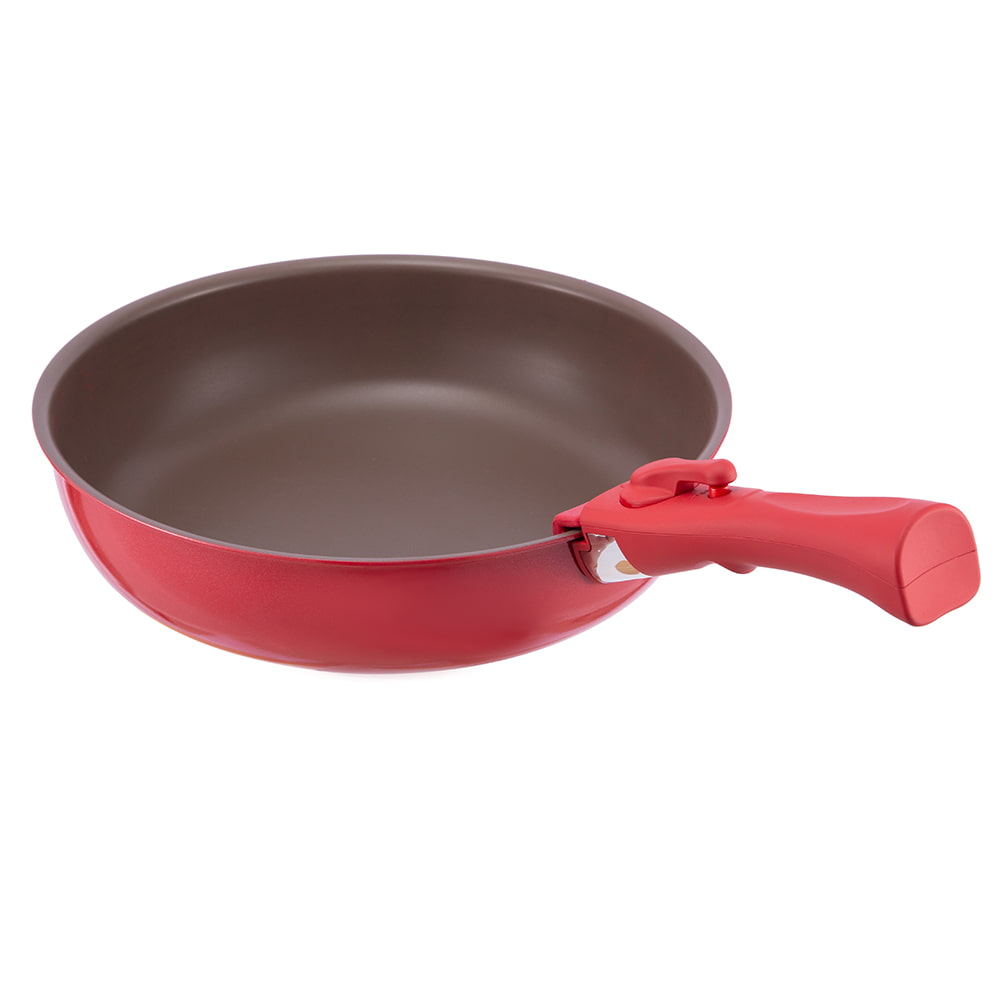The corrosion resistance of SUS304 stainless steel frying pans is a vital characteristic that contributes significantly to their longevity and overall performance. SUS304 stainless steel is a type of austenitic stainless steel known for its exceptional resistance to corrosion and rust.
SUS304 Stainless Steel Composition:
The corrosion resistance of SUS304 stainless steel frying pans primarily stems from their chemical composition. SUS304 is part of the austenitic family of stainless steels, which are alloyed with several key elements, including chromium, nickel, and sometimes molybdenum.
Chromium (Cr): Chromium is a critical element in stainless steel, and SUS304 typically contains around 18-20% chromium. When exposed to oxygen, chromium forms a thin, passive oxide layer on the surface of the steel. This oxide layer, commonly referred to as chromium oxide (Cr2O3), is highly stable and acts as a protective barrier that prevents further oxidation of the metal beneath. This barrier is what gives stainless steel its corrosion-resistant properties.
Nickel (Ni): Nickel is another essential element in SUS304 stainless steel. It contributes to the overall corrosion resistance of the material by enhancing the stability of the passive oxide layer. Nickel helps maintain the integrity of the oxide layer, even in harsh or corrosive environments, making the stainless steel more resistant to corrosion.
Corrosion Resistance Mechanism:
The corrosion resistance of SUS304 stainless steel frying pans can be explained through the following mechanisms:
Passive Oxide Layer: As mentioned earlier, the chromium in SUS304 stainless steel forms a passive oxide layer on the surface when exposed to oxygen. This layer acts as a shield, preventing direct contact between the metal and corrosive substances such as water, acids, and salts. Consequently, the stainless steel remains protected against corrosion.
Self-healing Properties: In the event that the passive oxide layer is scratched or damaged, SUS304 stainless steel has a remarkable self-healing ability. When exposed to oxygen, chromium in the surrounding areas of the damaged site quickly reacts to reform the protective oxide layer, effectively repairing the damage and maintaining the corrosion resistance of the pan.
Resistance to Pitting and Crevice Corrosion: SUS304 stainless steel is particularly resistant to pitting and crevice corrosion, which can occur when chloride ions are present. This resistance is crucial in kitchen environments where exposure to salty or acidic foods is common. The chromium oxide layer remains stable even in the presence of chloride ions, preventing localized corrosion.
Comparing SUS304 to Other Stainless Steel Grades:
While SUS304 stainless steel is highly corrosion-resistant, it's essential to recognize that not all stainless steel grades offer the same level of corrosion resistance. Several other stainless steel grades are commonly used in cookware and kitchen appliances, each with its own unique properties:
SUS316 Stainless Steel: This grade contains higher amounts of chromium and nickel compared to SUS304, making it even more resistant to corrosion, especially in environments with high chloride concentrations. SUS316 is often used in marine applications and some high-end cookware.
Ferritic Stainless Steel: Ferritic stainless steel grades (e.g., SUS430) contain little to no nickel and are less corrosion-resistant than austenitic stainless steel like SUS304. They may be more prone to rusting and corrosion in certain conditions.
Martensitic Stainless Steel: Martensitic stainless steel (e.g., SUS410) is known for its hardness and is used in some knife blades. However, it is not as corrosion-resistant as austenitic stainless steel and requires more maintenance to prevent rust.
Duplex Stainless Steel: Duplex stainless steels (e.g., SUS329J4L) offer a combination of high corrosion resistance and strength, making them suitable for demanding applications. However, they are less common in cookware.
It's essential to choose the right stainless steel grade for your specific cooking needs. For general-purpose frying pans and cookware, SUS304 stainless steel is an excellent choice due to its balanced corrosion resistance, durability, and affordability.
Maintaining Corrosion Resistance:
Cleaning: After each use, wash the pan with mild dish soap and warm water. Avoid using abrasive scouring pads or harsh cleaning agents that could scratch the surface, as scratches may compromise the passive oxide layer.
Drying: Thoroughly dry the pan after washing to prevent water spots or staining. Stainless steel can discolor if water spots are left to air dry.
Avoid Prolonged Exposure to Salt: While SUS304 stainless steel is resistant to pitting corrosion from salt, it's still a good practice to avoid prolonged exposure to salty or acidic foods. Rinse and dry the pan promptly after cooking such dishes.
Stainless Steel Safe Utensils: Use utensils made from materials that won't scratch the pan's surface, such as wood, silicone, or plastic.
Regular Maintenance: Periodically inspect your frying pan for any signs of damage or corrosion. If you notice any scratches or areas where the passive oxide layer may be compromised, address them promptly.
In conclusion, the corrosion resistance of SUS304 stainless steel frying pans is a fundamental feature that makes them durable and suitable for various cooking applications. This resistance is achieved through the formation of a protective passive oxide layer, and the inclusion of chromium and nickel in the alloy enhances its stability. Compared to other stainless steel grades, SUS304 offers a good balance of corrosion resistance, making it an ideal choice for everyday cookware. By following proper care and maintenance practices, you can ensure that your SUS304 stainless steel frying pan remains corrosion-resistant and continues to serve you well for many years to come.
 No. 1, Jingwei Road, Yangcheng Lake Town, Xiangcheng District, Suzhou City, China
No. 1, Jingwei Road, Yangcheng Lake Town, Xiangcheng District, Suzhou City, China [email protected]
[email protected] +86-13913553688
+86-13913553688
 search
search
 中文简体
中文简体 English
English русский
русский Français
Français Español
Español 日本語
日本語






-4.jpg)
-1.jpg)

-3.jpg)
-5.jpg)

-3.jpg)
-9.jpg)
-3.jpg)
-14.jpg)

